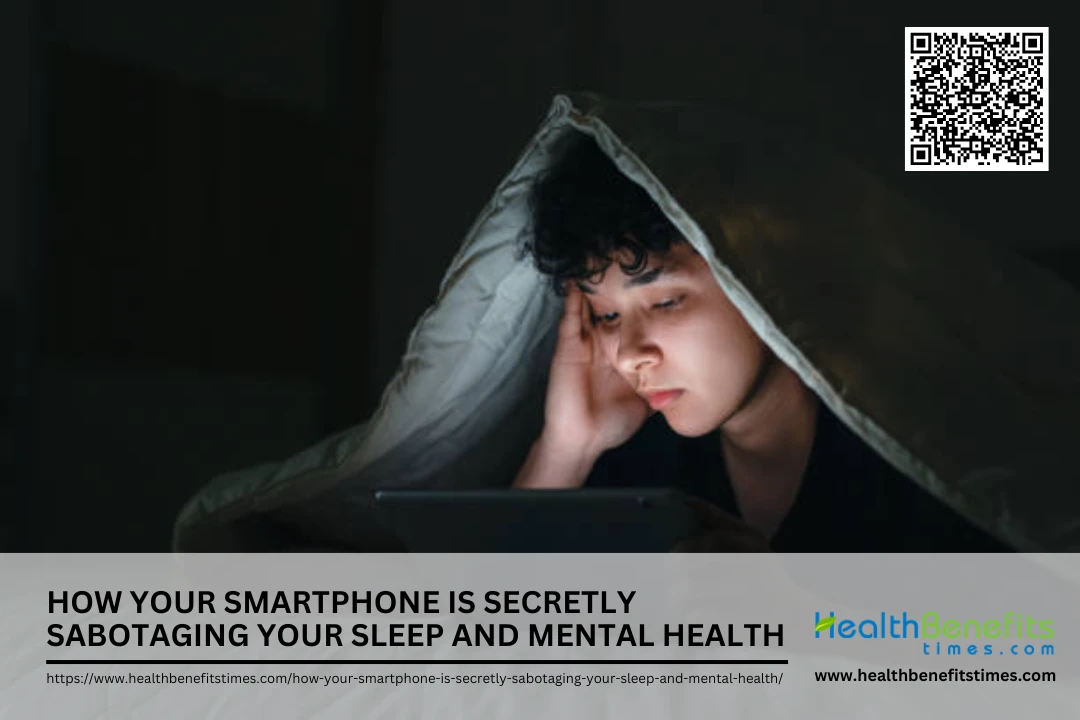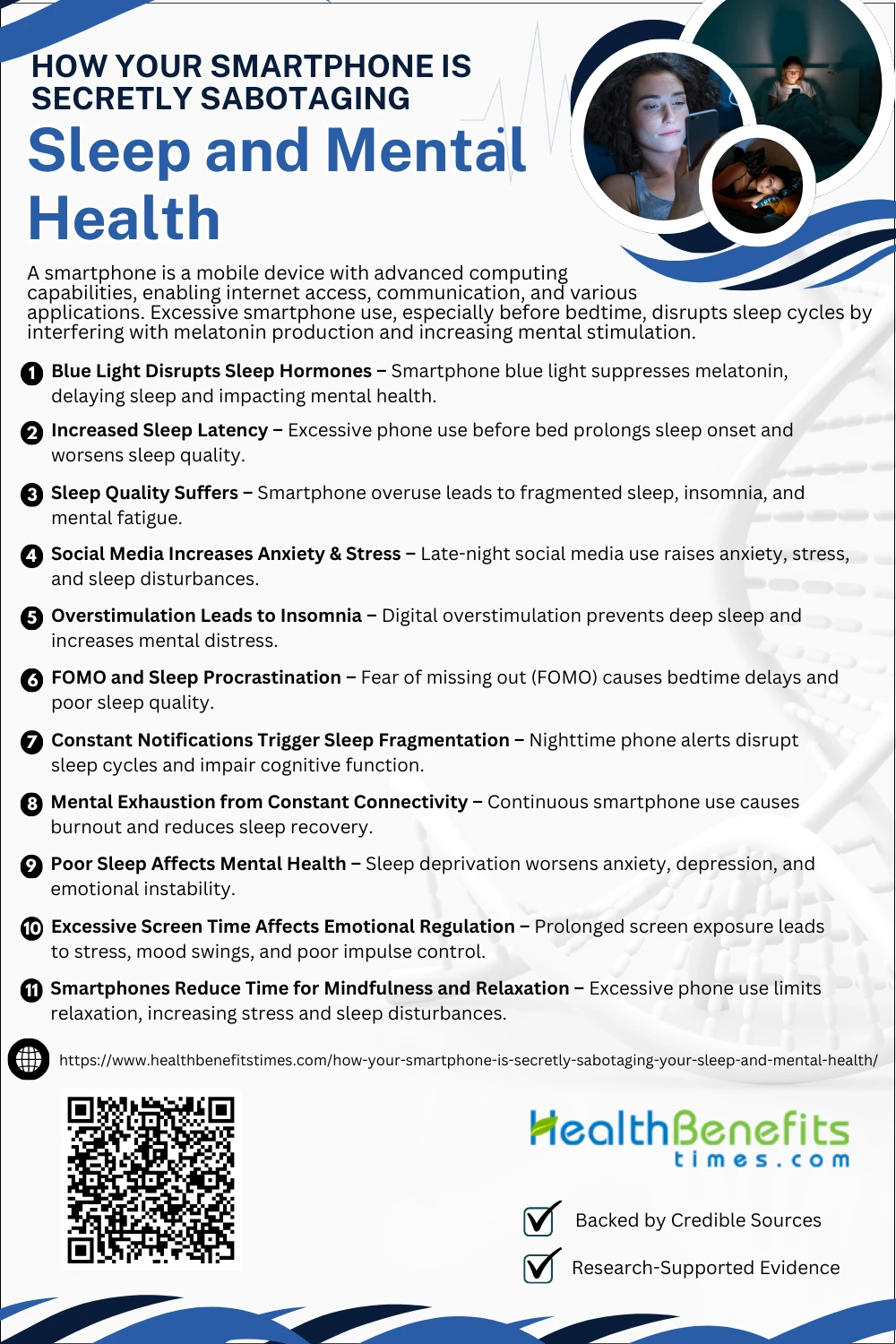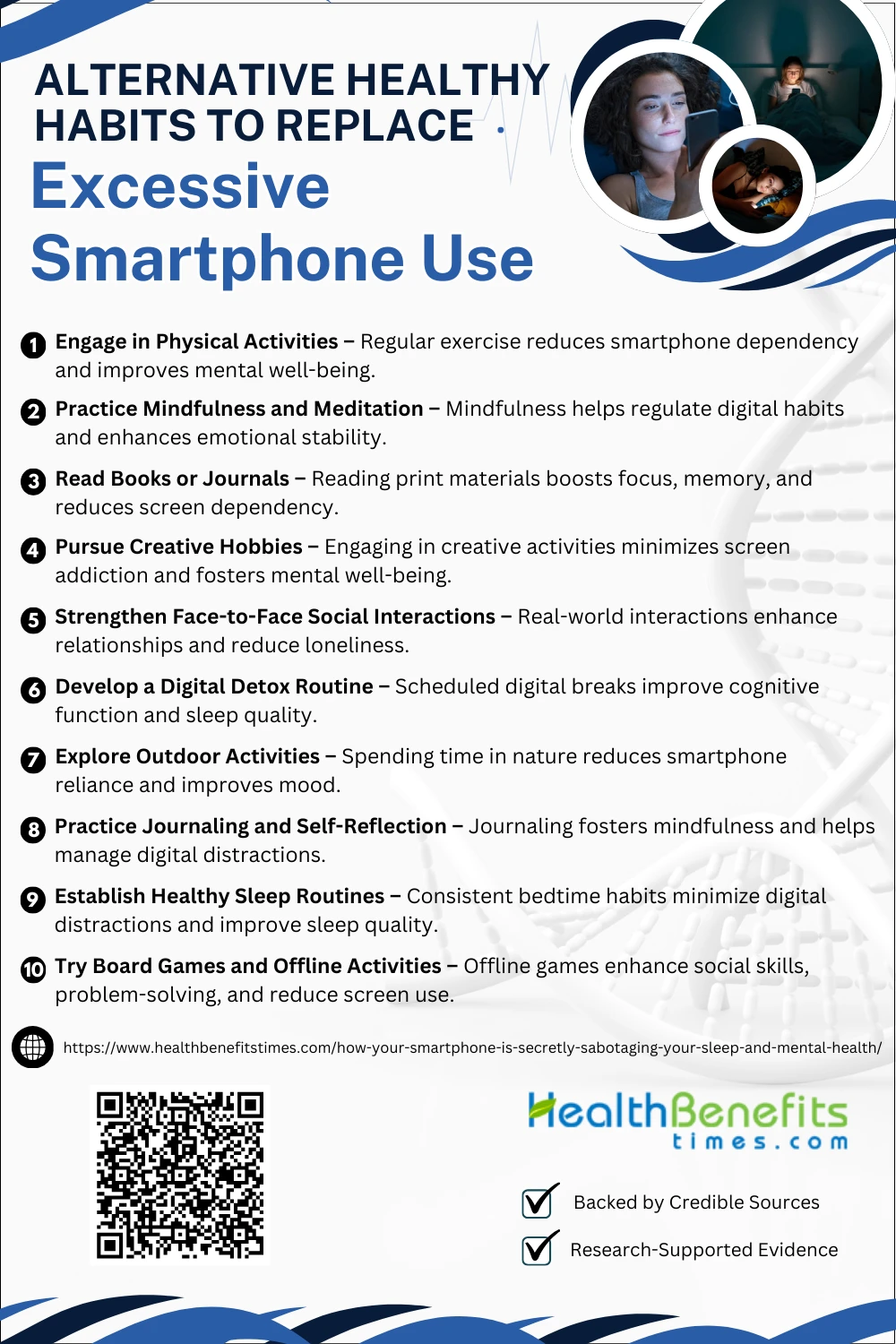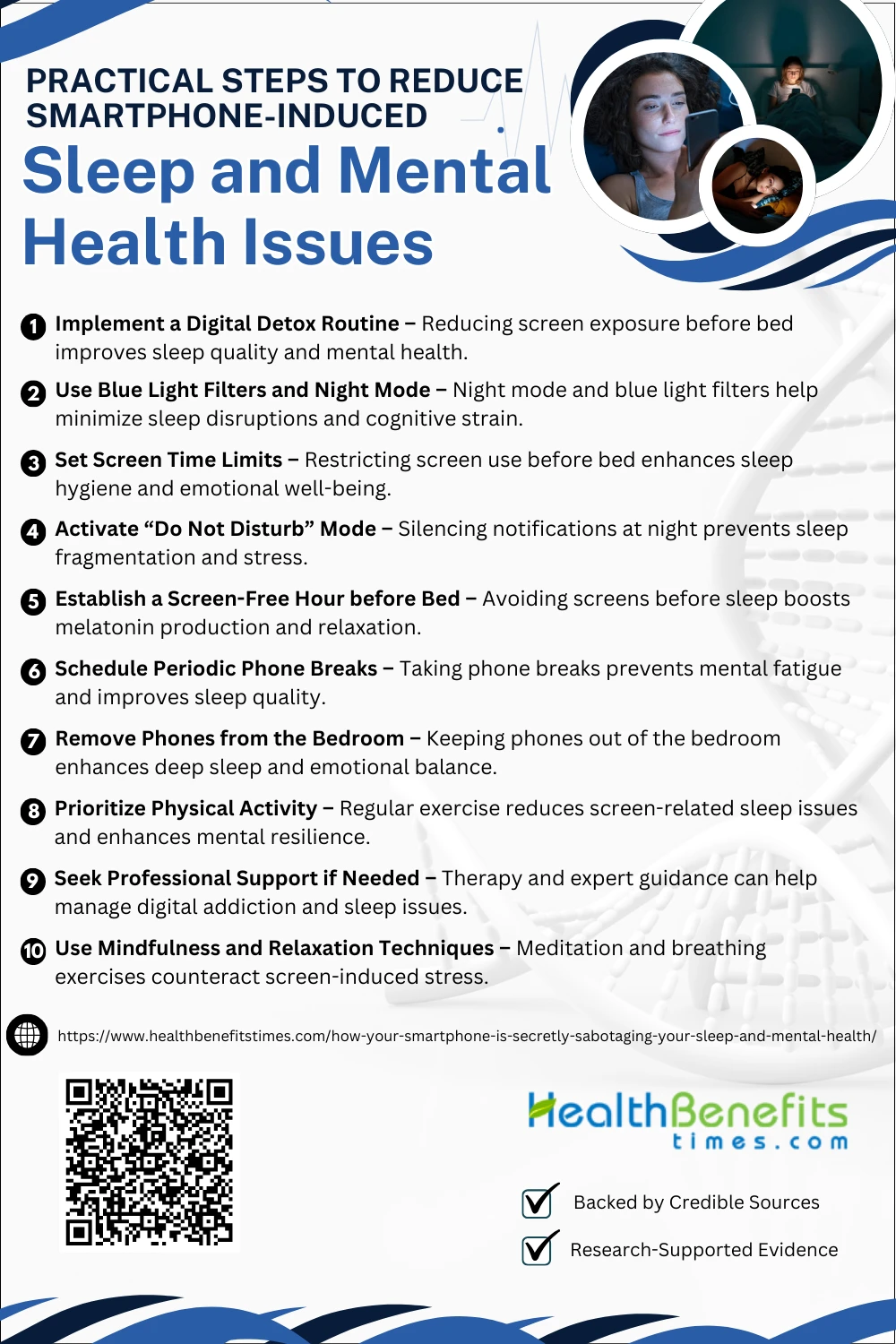- A smartphone is a mobile device with advanced computing capabilities, enabling internet access, communication, and various applications.
- Excessive smartphone use, especially before bedtime, disrupts sleep cycles by interfering with melatonin production and increasing mental stimulation.
- Constant notifications, social media, and screen exposure contribute to stress, anxiety, and mental fatigue, affecting overall well-being.
 A smartphone is a handheld electronic device that combines mobile phone functionality with advanced computing capabilities, enabling internet access, app usage, and multimedia consumption. While smartphones have revolutionized communication and convenience, their pervasive presence in daily life may come at a hidden cost—our sleep and mental well-being. Research suggests that smartphone addiction is increasingly linked to poor sleep quality and heightened mental health issues among users. Studies indicate that excessive smartphone use, especially before bedtime, disrupts sleep cycles by exposing users to blue light, which suppresses melatonin production and delays sleep onset. Moreover, the constant notifications and social media engagement contribute to stress, anxiety, and reduced attention spans, exacerbating mental health issues such as depression and insomnia.
A smartphone is a handheld electronic device that combines mobile phone functionality with advanced computing capabilities, enabling internet access, app usage, and multimedia consumption. While smartphones have revolutionized communication and convenience, their pervasive presence in daily life may come at a hidden cost—our sleep and mental well-being. Research suggests that smartphone addiction is increasingly linked to poor sleep quality and heightened mental health issues among users. Studies indicate that excessive smartphone use, especially before bedtime, disrupts sleep cycles by exposing users to blue light, which suppresses melatonin production and delays sleep onset. Moreover, the constant notifications and social media engagement contribute to stress, anxiety, and reduced attention spans, exacerbating mental health issues such as depression and insomnia.
The impact of smartphone usage on mental health is particularly pronounced among adolescents and young adults, who exhibit higher rates of problematic mobile phone use (PMPU) and report increased symptoms of depression and anxiety. Additionally, studies reveal that smartphone overuse negatively affects cognitive function by overloading the brain with digital stimuli, leading to poor focus and memory decline. Even more concerning is the circular relationship between smartphone use, sleep, and mental health. Individuals with existing mental health conditions tend to rely on their smartphones more frequently, further disrupting their sleep cycles and intensifying emotional distress. Adolescents who frequently bring their smartphones to bed report poorer sleep quality and heightened stress levels compared to those who practice digital detox before sleep. As the digital age progresses, understanding the hidden consequences of smartphone dependence is critical for maintaining healthy sleep patterns and mental well-being. This article explores how smartphones contribute to sleep disturbances and mental health issues, backed by extensive research, and offers actionable solutions to mitigate these negative effects.
The Science behind Smartphone-Induced Sleep Disruptions
Smartphones significantly interfere with sleep by emitting blue light, which suppresses melatonin production and delays sleep onset. (1) Studies show that blue light exposure before bedtime reduces sleep quality and increases nighttime awakenings. (2) Additionally, smartphone use delays circadian rhythms, making it harder to fall and stay asleep. (3) Disrupting these sleep patterns contributes to daytime fatigue, cognitive decline, and increased stress levels. (4)
How Your Smartphone Is Secretly Sabotaging Your Sleep and Mental Health
Your smartphone might be silently harming your sleep and mental well-being. From disrupting melatonin production to fueling stress and anxiety, its constant presence can impact your health in ways you never imagined.
 1. Blue Light Disrupts Sleep Hormones
1. Blue Light Disrupts Sleep Hormones
Exposure to blue light from smartphones at night suppresses melatonin, a hormone that regulates sleep, leading to delayed sleep onset and poor sleep quality. (5) Studies reveal that blue light exposure at night affects mood regulation by altering brain circuits associated with emotional stability. (6) Additionally, prolonged exposure increases the risk of depression and anxiety. (7) Blue light also disrupts circadian rhythms, which can negatively impact overall mental well-being. (8) Research further highlights that excessive screen time may contribute to cognitive decline and stress. (9)
2. Increased Sleep Latency (Takes Longer to Fall Asleep)
Excessive smartphone use before bedtime increases sleep latency, making it harder to fall asleep due to blue light exposure and mental stimulation. (10) Research shows that prolonged screen time suppresses melatonin production, delaying sleep onset and reducing overall sleep efficiency. (11) Additionally, smartphone engagement activates the brain’s reward system, making it difficult to unwind. (12) Adolescents who use smartphones late at night report higher stress levels and poor mental health outcomes. (13) Increased sleep latency contributes to chronic fatigue, mood instability, and cognitive decline, exacerbating mental distress. (14)
3. Sleep Quality Suffers
Smartphone overuse reduces sleep quality, leading to fragmented sleep, shorter sleep duration, and increased nighttime awakenings (Soni et al., 2017). (15) Studies indicate that excessive social media and late-night browsing elevate stress hormones, worsening sleep efficiency (Moattari et al., 2017). (16) Individuals with problematic smartphone use report higher levels of depression, anxiety, and fatigue due to poor sleep (Tao et al., 2017). (10) Research further confirms that excessive smartphone use before bed results in insomnia symptoms and impaired cognitive function (Huang et al., 2020). (17) Addressing this issue requires reducing screen time, establishing digital detox routines, and improving bedtime habits (Acikgoz et al., 2022). (18)
4. Social Media Increases Anxiety & Stress
Excessive social media use has been linked to heightened anxiety, stress, and disrupted sleep patterns, particularly among young adults. (19) Studies indicate that social comparison and cyber interactions trigger increased cortisol levels, leading to chronic stress. (20) The fear of missing out (FOMO) further fuels nighttime scrolling, delaying sleep onset and impairing sleep quality. (21) Adolescents who engage in late-night social media use report higher levels of depression and low self-esteem due to sleep deprivation. (22) Reducing screen exposure before bedtime is crucial for mitigating these negative effects. (23)
5. Overstimulation Leads to Insomnia
Overstimulation from constant smartphone use and digital exposure is a major contributor to insomnia and mental distress. (24) Research highlights that chronic sensory overload from excessive screen time disrupts the brain’s ability to transition into restful sleep. (25) This leads to hyperarousal, a physiological state where the brain remains overactive, preventing deep sleep. (26) Persistent overstimulation and sleep loss increase the risk of depression, anxiety, and cognitive decline. (27) Digital detox strategies, such as reducing screen exposure before bed, can significantly improve sleep quality.
6. FOMO and Sleep Procrastination
The fear of missing out (FOMO) significantly contributes to sleep procrastination, delaying bedtime as individuals stay engaged in social media and online activities. (28) Research shows that FOMO increases bedtime scrolling, causing reduced sleep quality and mental exhaustion. (29) Adolescents who experience FOMO have higher anxiety levels and depressive symptoms, leading to poor mental health outcomes. (30) Studies confirm that prolonged screen exposure before bed affects emotional regulation, worsening mood instability. (31) Addressing FOMO-driven sleep procrastination requires digital detox strategies and disciplined screen-time habits. (32)
7. Constant Notifications Trigger Sleep Fragmentation
Frequent smartphone notifications cause sleep fragmentation, disrupting deep sleep cycles and leading to poor cognitive function. (33) Research indicates that interrupted sleep reduces REM sleep duration, impairing memory consolidation and emotional stability. (34) Micro-awakenings triggered by notifications prevent the body from reaching a fully restorative sleep state, increasing the risk of insomnia and mental fatigue. (35) Studies confirm that night-time notification exposure is linked to anxiety and heightened stress levels. (36) To prevent notification-induced sleep fragmentation, experts recommend enabling “Do Not Disturb” mode and minimizing phone use before bed. (37)
8. Mental Exhaustion from Constant Connectivity
The constant connectivity of smartphones and digital devices contributes to mental exhaustion, reducing the brain’s ability to recover during sleep. (38) Studies show that overexposure to digital information causes chronic stress and burnout, impairing cognitive function. (39) Additionally, the lack of psychological detachment from online interactions disrupts sleep, leading to poor emotional regulation. (40) Research confirms that excessive digital engagement heightens anxiety and depressive symptoms. (41) Limiting screen time and setting digital boundaries are essential for improving sleep quality and mental well-being. (42)
9. Poor Sleep Affects Mental Health
Chronic sleep deprivation is strongly associated with increased risks of anxiety, depression, and emotional instability. (43) Poor sleep quality has been linked to cognitive decline and weakened stress resilience, particularly among students and working professionals. (44) Research suggests that individuals experiencing disrupted sleep cycles are more likely to develop mental health disorders, including mood swings and heightened irritability. (45) Additionally, sleep fragmentation weakens the brain’s ability to regulate emotions, contributing to negative thought patterns. (46) Prioritizing consistent sleep hygiene can significantly improve mental well-being and emotional balance. (47)
10. Excessive Screen Time Affects Emotional Regulation
Excessive screen time disrupts emotional regulation, leading to increased stress, anxiety, and mood swings. (48) Studies show that prolonged exposure to digital devices weakens impulse control and emotional stability. (49) Furthermore, disrupted sleep cycles from screen overuse contribute to heightened irritability and cognitive difficulties. (50) Research highlights a direct correlation between digital overuse and emotional dysregulation, particularly in adolescents. (51) Reducing screen exposure before bed can help restore emotional balance and improve sleep quality. (52)
11. Smartphones Reduce Time for Mindfulness and Relaxation
Smartphone overuse significantly reduces time for mindfulness and relaxation, increasing stress and sleep disturbances. (53) Research suggests that constant smartphone distractions prevent individuals from engaging in calming bedtime rituals, leading to increased nighttime anxiety. (54) A study on college students found that mindfulness practices were significantly hindered by smartphone dependency, negatively affecting sleep quality and mental health. (55) Furthermore, poor relaxation habits due to excessive screen use contribute to higher cortisol levels, increasing stress. (56) Incorporating screen-free mindfulness exercises before bedtime can enhance sleep and emotional stability. (57)
Practical Steps to Reduce Smartphone-Induced Sleep and Mental Health Issues
Reducing smartphone-induced sleep and mental health issues starts with simple changes. By setting boundaries, limiting blue light exposure, and adopting mindful habits, you can regain control over your sleep and well-being.
1. Implement a Digital Detox Routine
A digital detox routine can significantly improve sleep quality and mental well-being by reducing smartphone-induced distractions and overstimulation. (58) Studies show that intentional disconnection from screens before bedtime helps regulate melatonin production and stress levels . (59) Implementing daily screen-free intervals reduces anxiety, depression, and digital dependency, promoting a healthier sleep cycle. (60)
2. Use Blue Light Filters and Night Mode
Blue light emitted from smartphones negatively impacts melatonin secretion, delaying sleep onset and reducing sleep quality. (61) Studies confirm that activating night mode and using blue light filters can mitigate sleep disturbances and cognitive overload (Mac Cárthaigh, 2022). Research further suggests that limiting blue light exposure before bed improves REM sleep and mental stability. (62)
3. Set Screen Time Limits
Setting screen time limits can help reduce smartphone-induced sleep disruptions and mental health problems by decreasing digital overuse before bedtime. (58) Studies confirm that screen overuse at night is linked to poor sleep quality and increased anxiety. (63) Implementing daily screen restrictions improves sleep hygiene and emotional regulation.
4. Activate “Do Not Disturb” Mode
Enabling Do Not Disturb mode at night minimizes sleep fragmentation caused by smartphone notifications, improving sleep efficiency. (64) Research highlights that interruptions from late-night notifications increase stress levels and decrease cognitive function. (60) Studies suggest that reducing notification-related disturbances can significantly enhance mental well-being and sleep quality. (65)
5. Establish a Screen-Free Hour before Bed
Setting a screen-free hour before bed significantly improves sleep quality and mental well-being by allowing the brain to unwind without digital overstimulation. Studies show that limiting smartphone use before sleep reduces stress levels and enhances melatonin production. (58) Creating a screen-free bedtime ritual helps promote better sleep hygiene and emotional stability.
6. Prioritize Physical Activity
Engaging in regular physical activity mitigates smartphone-induced sleep disruptions and enhances mental resilience. (66) Research suggests that exercise reduces anxiety and stress levels, counteracting the negative effects of excessive screen time. (58) Additionally, prioritizing outdoor activities and mindfulness-based exercises improves cognitive function and sleep efficiency.
7. Schedule Periodic Phone Breaks
Taking regular phone breaks throughout the day helps prevent mental fatigue and sleep disturbances caused by smartphone overuse. (59) Studies show that excessive screen exposure leads to cognitive overload and stress, negatively affecting sleep quality. (67) Implementing structured phone-free intervals has been linked to improved focus, reduced anxiety, and better sleep hygiene. (68)
8. Remove Phones from the Bedroom
Eliminating smartphones from the bedroom improves sleep duration and mental health by reducing nighttime distractions and blue light exposure. (58) Research suggests that individuals who sleep without their phones experience deeper rest and lower stress levels. (69) Additionally, removing screens from sleeping areas has been linked to better sleep quality and improved emotional regulation. (63)
9. Use Mindfulness and Relaxation Techniques
Practicing mindfulness and relaxation techniques before bed can help counteract smartphone-induced stress and sleep disruptions. (70) Studies indicate that meditation and yoga reduce cortisol levels, improving emotional stability and sleep quality. (69) Implementing screen-free mindfulness exercises, such as breathing techniques and guided relaxation, has been shown to improve mental clarity and well-being. (68)
10. Seek Professional Support if Needed
If smartphone overuse is causing chronic sleep problems and mental distress, seeking professional support can be beneficial. (58) Research shows that cognitive behavioral therapy (CBT) effectively reduces digital addiction and improves sleep patterns. Additionally, mental health professionals can help develop personalized strategies to manage screen time and sleep hygiene. (71)
Alternative Healthy Habits to Replace Excessive Smartphone Use
Replacing excessive smartphone use with healthier habits can improve your well-being. Engaging in hobbies, practicing mindfulness, exercising, or reading can help you disconnect, reduce stress, and enhance sleep quality naturally.
 1. Engage in Physical Activities
1. Engage in Physical Activities
Excessive smartphone use can lead to physical and mental health issues, but engaging in physical activities offers an effective replacement strategy. Research indicates that regular exercise improves mood and reduces dependence on digital devices [Rahaei & Rastjoo, 2024]. ({% trusted %}) A study found that adolescents who participated in structured physical activities experienced reduced screen time and increased psychological well-being [Tei et al., 2025]. ({% trusted %}) Furthermore, interventions promoting movement-based habits were shown to help users disengage from excessive smartphone use [Egilsson, 2024]. ({% trusted %})
2. Practice Mindfulness and Meditation
Mindfulness and meditation offer effective alternatives to excessive smartphone use by improving self-awareness and reducing compulsive behaviors. Studies show that mindfulness practices help individuals monitor their digital consumption and promote healthier screen habits. (72) Research on adolescents demonstrated that meditation interventions significantly reduced smartphone addiction and improved overall mental well-being. (73) Additionally, short-term mindfulness exercises were found to be more effective than unstructured screen time in enhancing emotional regulation. (74)
3. Read Books or Journals
Replacing excessive smartphone use with reading books or journals can enhance cognitive skills and reduce digital dependency. Studies show that reading physical books improves focus and comprehension compared to screen-based reading. (75) Additionally, research highlights that students who read print materials instead of digital screens exhibit better memory retention and reduced distractions. (76) Engaging in offline reading has also been found to lower stress and promote mindfulness, reducing compulsive smartphone habits. (77)
4. Pursue Creative Hobbies
Engaging in creative hobbies such as painting, writing, or playing musical instruments can effectively replace excessive smartphone use and boost mental well-being. Research suggests that pursuing artistic hobbies fosters mindfulness and reduces screen addiction. (78) Studies also indicate that individuals who engage in hands-on creative activities experience improved emotional regulation and decreased dependence on digital entertainment. (79) Furthermore, replacing screen time with productive hobbies has been shown to enhance cognitive flexibility and overall happiness. (80)
5. Strengthen Face-to-Face Social Interactions
Replacing excessive smartphone use with face-to-face social interactions enhances emotional well-being and strengthens relationships. Studies indicate that individuals who engage in real-world conversations develop better social skills and deeper emotional connections. (81) Research also highlights that reducing screen time fosters meaningful social interactions and reduces feelings of loneliness. (82) Additionally, social activities such as group discussions and community participation are effective in curbing smartphone addiction and improving psychological well-being. (83)
6. Develop a Digital Detox Routine
A structured digital detox routine helps reduce smartphone dependence and improves mental clarity. Research suggests that periodic breaks from digital devices enhance cognitive function and reduce stress. (84) Studies on digital detox interventions reveal that scheduled disconnection from screens fosters better sleep and productivity. (85) Additionally, gradual reduction of screen time through digital well-being apps has been found to be an effective behavior change strategy. (86)
7. Explore Outdoor Activities
Engaging in outdoor activities can effectively reduce smartphone dependency while improving physical and mental well-being. Research highlights that spending time in nature enhances mood and decreases compulsive digital engagement. (87) Studies also indicate that outdoor group activities promote social bonding and mindfulness, reducing digital distractions. (81) Additionally, participation in recreational sports and adventure-based programs has been found to improve focus and emotional resilience. (82)
8. Practice Journaling and Self-Reflection
Journaling and self-reflection provide a structured way to replace excessive smartphone use by fostering mindfulness and emotional regulation. Research suggests that journaling enhances self-awareness and reduces the urge for digital distractions. (88) Studies also highlight that individuals practicing reflective writing experience reduced smartphone addiction and improved cognitive processing. (89) Furthermore, engaging in personal informatics and self-tracking through journaling has been linked to better emotional well-being and digital detox effectiveness. (90)
9. Try Board Games and Offline Activities
Board games and offline activities offer engaging alternatives to excessive smartphone use by fostering social interaction and cognitive skills. Research suggests that structured offline games improve focus and reduce digital addiction. (94) Studies also highlight that board games enhance problem-solving abilities and strengthen family bonds, reducing screen dependency. (92) Additionally, offline social activities promote mental well-being and reduce the urge for excessive smartphone engagement. (93)
10. Establish Healthy Sleep Routines
A structured sleep routine significantly reduces excessive smartphone use and enhances cognitive function. Studies also indicate that practicing consistent bedtime habits enhances overall well-being and minimizes digital distractions. (81) Furthermore, reducing blue light exposure before sleep is linked to better sleep cycles and decreased smartphone dependency. (84)
Conclusion
Your smartphone, while essential, might be silently harming your sleep and mental health. From disrupting sleep cycles to increasing stress and anxiety, its effects can be profound. However, by setting boundaries, limiting screen time, and adopting healthier habits, you can take back control. Small changes—like reducing nighttime phone use, engaging in offline activities, and practicing mindfulness—can significantly improve your well-being. The key is balance; your phone should serve you, not control you. Are you ready to reclaim your rest and mental clarity?



